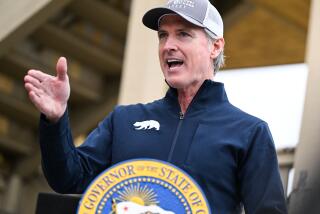Bird Campaign Accuses KNBC of Censorship in Blacking Out Interview
- Share via
Campaign officials representing California Chief Justice Rose Elizabeth Bird Friday accused Los Angeles television station KNBC of censorship for refusing to show an installment of the “Donahue” program devoted to a live interview with Bird.
KNBC Channel 4 was the only station among 12 in California carrying “Donahue” that chose not to televise the interview with Bird on Friday. KNBC officials said they did not run it because the program did not invite anyone opposing Bird to appear with her. The officials said that adherence to the Federal Communication Commission’s fairness doctrine precluded them from showing the program.
Bill Emerson, manager of broadcast standards and practices for KNBC, said the station already has devoted more than twice as much air time to Bird or her supporters as it has to her opponents and that airing “Donahue” Friday would have created an indefensible imbalance. Emerson said that, since the June primary election, KNBC has televised 104 minutes of program time that he said was favorable to Bird and only 39 minutes of time unfavorable to her. In addition, he said, KNBC has broadcast 29 minutes of pro-Bird campaign advertising as opposed to 19 minutes of advertising critical of her.
Balanced Discussion
Spokesmen for Bird said that the decision not to televise “Donahue” deprived voters of witnessing a serious, balanced discussion of key issues surrounding the judicial election.
“At a time when Californians are looking for enlightenment on this issue, KNBC has decided to turn out the lights,” said Steven Glazer, director of communications for Bird’s campaign. “Channel 4’s actions to censor this show is a dangerous restriction of the public’s right to know.”
Glazer said the station’s decision was especially reprehensible in light of an editorial slant critical of the chief justice.
“They have taken every opportunity to criticize the chief justice throughout this election campaign,” Glazer said.
According to Emerson, the station has run one editorial critical of the court’s decisions but has not come out against Bird’s reelection.
Another spokesman for Bird’s campaign, Charles Firestone, a Los Angeles attorney specializing in communications law, said KNBC was using the fairness doctrine as “a smoke screen.”
He described “Donahue” as a “hard-hitting, bona fide news show that does not offer a one-sided view of an issue or a campaign.
“For them to hide behind the fairness doctrine is ridiculous,” Firestone said.
However, a spokesman for the FCC said that KNBC did have the right to decline to carry the show.
“The station is free to do what it wants,” said Milton Gross, who heads the FCC office dealing with fairness in politics.
KNBC officials said Friday that, in lieu of the “Donahue” show, they would set aside half an hour at 5:30 p.m. Sunday for a debate between Bird and a representative of her opposition.
Glazer said he has not been able to relay the invitation to Bird, who was in New York Friday for her television appearance, but he said that Sunday is the chief justice’s 50th birthday and that she usually spends her birthday with family members.
“If KNBC really wants to be fair,” Glazer said, “they should air the Donahue program (with Bird) on Monday.”
Although Bird did appear without an opponent on the “Donahue” show, she did not go unchallenged, as the program’s host, Phil Donahue, and several members of the studio audience pressed her to show that she was not a biased judge, unwilling to impose the death penalty in criminal cases.
As she has throughout the campaign, Bird refused to reveal her personal feelings about the death penalty, saying that they are irrelevant and suggesting that even if she opposed the death penalty it did not mean that she would be unable to carry out the state death penalty law.
She said there are many Roman Catholic judges whose objections to divorce do not prevent them from carrying out divorce laws.
“My personal views on any issues are irrelevant. And if you start down that line of how you feel about divorce, are you going to then say that all of the practicing Catholics can’t sit as judges because they don’t believe in divorce? We have many, many Catholics sitting on the bench who implement the law every day even though they may not agree to it,” Bird said.
‘I Will Follow’ Oath
“What I have to say is that I as judge take an oath of office. That oath says that I do not substitute my judgment on any law, whether I think it’s wise or not. I will follow that whether it is for spitting on the sidewalk or the death penalty.”
Bird’s efforts to convince a New York audience that the court’s death penalty reversals are based on important legal principles and not technicalities seemed to elicit a mixed response. Some people appeared to be convinced by her contention that the court’s 61 reversals were the result, primarily, of a poorly drafted death penalty law that did not adhere to constitutional requirements for a fair trial. But other people were unmoved by Bird’s arguments, saying that they still felt that the court was basing its reversals on technicalities.
“Don’t you realize you are giving the green light to every psycho and murderer?” asked one member of the audience. But despite the skepticism of some, Bird’s comments drew enthusiastic applause more than once. And one member of the audience told her that if Bird loses in California, she would be welcome to go to his state of Connecticut.
More to Read
Sign up for Essential California
The most important California stories and recommendations in your inbox every morning.
You may occasionally receive promotional content from the Los Angeles Times.













